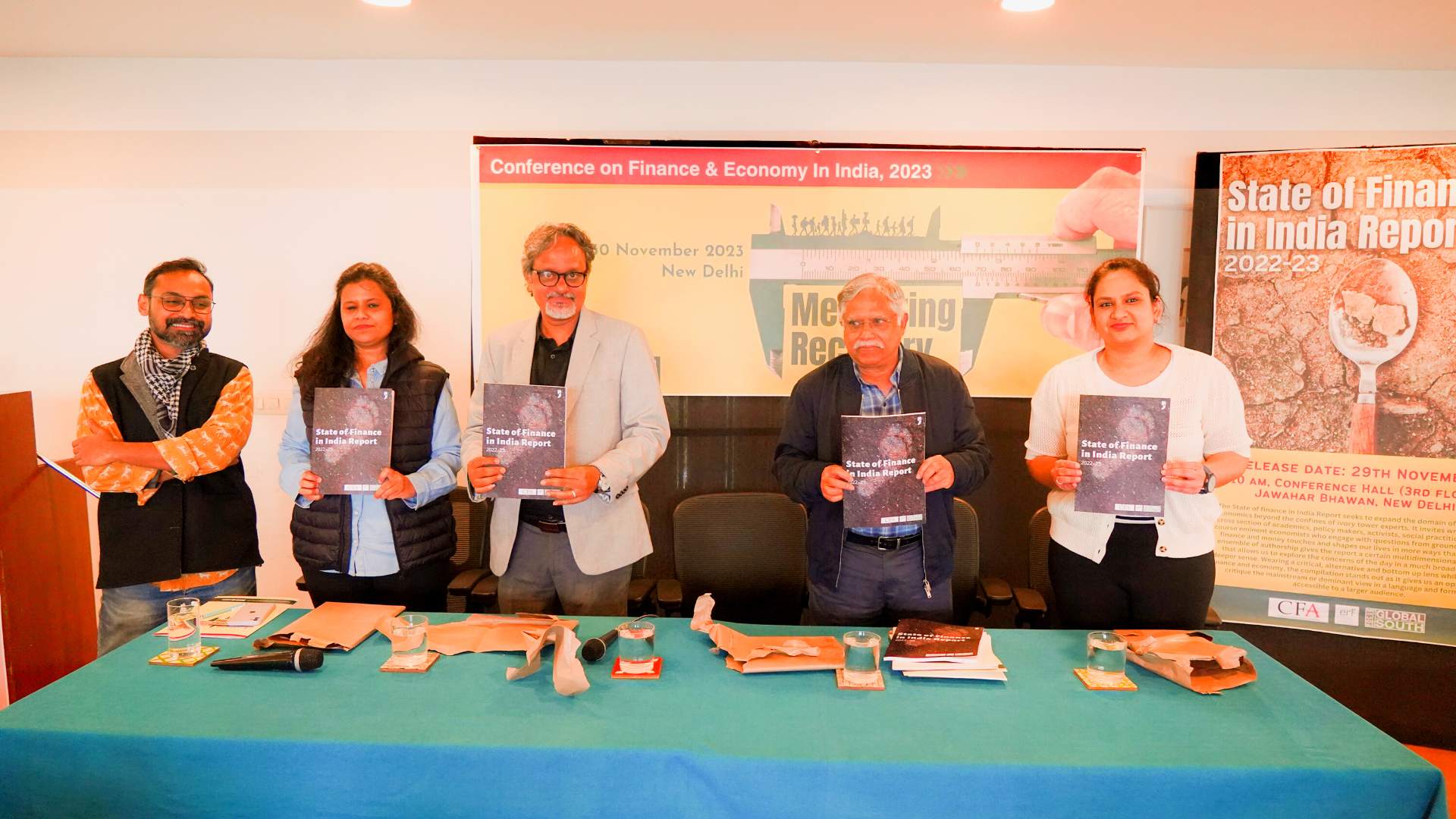Press Release: 29th November 2023
New Delhi: “The flow of 100 billion dollars for climate finance from developed to developing countries for mitigation and adaptation of climate impacts are neither enough to meet the needs of addressing the climate crisis which is in trillions of dollars nor does it make the developed countries accountable for their historical responsibilities.” said economist C P Chandrashekhar. He was speaking at the launch of the second edition of the report ‘State of Finance in India’ at Jawahar Bhawan in Delhi today. Successful mobilisation of resources to finance climate projects at scale must be based on drawing surpluses away from the private sector, and into public hands, establishing accountable institutions capable of allocating those resources, and ensuring that the charges imposed on uses of that finance are such that they foreclose crucial mitigation and adaptation efforts, he added.
The theme of the book this year is the climate crisis. Over the last few years, climate finance has emerged as a focal point of international discussions. The divide between the advanced capitalist countries and the global south; the contradictions between a market based approach and a structural overhaul of our growth and energy trajectory; the funding of false solutions versus the idea of just transition – there are a lot of perspectives that clash in this arena of climate finance. It is pertinent to thereby do a critical stock taking of India’s position within this matrix and that is what this edition attempts to do in the first segment. In the second segment called Sectoral Overview the attempt would be to highlight from a critical point of view of finance and economy, the developments at the given point in time across a broad stroke of sectors. Report of the release was held at the third Conference on Finance and Economy in India attended by academics, experts and activists from various parts of the country.
The report launch was succeeded by a two-day conference on finance in India which aims to look closely into the economic context today and do a multidimensional assessment of the official claims of economic recovery both at macro level and in terms of the impact on the marginalised communities. The theme of the conference is ‘measuring recovery’ and is attended by economists, policy enthusiasts, activists, academicians, students, and concerned citizens alike. Professor Arun Kumar, Paranjoy Guha Thakurta, Harsh Mander, Prof Praveen Jha, Mrinalini Jha, Ritwick Dutta, Fatima Khan, Ghazala Jamil, Prof. Surajit Mazumdar, Thomas Franco and others are speaking at the conference happening at the same venue at Jawahar Bhawan.
Speaking at the report launch, scientist and activist, Soumya Dutta said, “Though there are a lot of talks around climate finance, the money is nowhere to be seen. The Global North dictates funds disbursements in more ways than one.”
Twenty-one authors including Prasanna Mohanty, Rohit Azad, Shouvik Chakraborty, Manshi Asher, Gaurav Dwivedi, Dr. Simin Akhter Naqvi, Chirashree Das Gupta, Zico Dasgupta, Shantanu Srivastava, Shivika Solanki, Rini Dutt, Suranjali Tandon, Om Prakash, Rosamma Thomas, Indranil, Soumyadip Roy, Sudipta Sen and Soumya Dutta among others have come together to write 16 chapters of the report. Apart from the focus chapters on Climate Finance, this report looks into infrastructure, health, welfare spending, banking, taxation among others.
The section on Climate Finance looks into Indian bank’s response to Climate Crisis, political economy of climate finance, hydro-colonialism, unpacking of climate expenditure in Union and state budgets, carbon markets and price of low carbon transition.
In the other section, the report looks critically at the National Monetization Pipeline (NMP), introduced in 2021 by the government, highlighting the concerns of the unclear new infrastructure creation, budgetary inconsistencies, and a lack of transparency.
The flagship project, Smart City Mission is thoroughly examined offering insights into project completion rates, funds utilization and challenges faced. It highlights disparities among cities, financial discrepancies, and issues related to marginalized communities exclusion.
As the government announces substantial corporate loan waivers, critical welfare programs are facing severe budget cuts. This includes nutrition, education, healthcare, and support for the working poor is analysed looking at the government’s welfare spending.
The report also attempts to chronicle the impact of the divisive policies of the government on the socioeconomic status of the most marginalised, including Dalits, Muslims, Tribals, Women, and Transgender, who continue to face economic marginalization due to differential job concentration, limited access to education, and discriminatory labour market practices.
Though the government has boasted a lot about its GST earnings, the report shows how this reliance on indirect taxes is a system that perpetuates fiscal crises, income inequality, and hinders social welfare and human development. Moreover, the report also calls for more equitable tax policies and a reconsideration of fossil fuel strategies in India.
An overview of the banking sector shows how the write offs to big corporates ultimately reduce the ability of public sector banks to give credit to those who actually need it. The fall in priority sector lending is evidence of the same.
Wearing a critical, alternative and bottom-up lens while looking at finance and economy, the compilation stands out as it gives us an opportunity to critique the mainstream or dominant view in a language and form that is accessible to a larger audience. The report is a result of the combined efforts of Centre for Financial Accountability, the Economic Research Foundation and Focus on Global South.
Edited by CP Chandrashekhar, Jayati Ghosh, Shalmali Guttal, Joe Athialy and Anirban Bhattacharya and published by Yoda press, the report is a first of its kind that expands the domain of finance and economics beyond the confines of ivory tower experts. The report invites writings from a cross-section of academics, policy makers, activists, social practitioners and eminent economists who engage with questions from the ground.
For more information write to: kavita@cenfa.org

